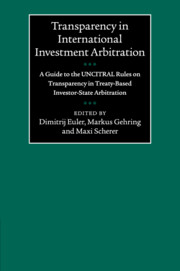 Transparency in International Investment Arbitration
Transparency in International Investment Arbitration Book contents
- Frontmatter
- Contents
- Contents
- List of contributors
- Foreword
- Acknowledgements
- Table of treaties, guidelines and rules
- Table of cases
- List of abbreviations
- 1 Introduction
- 2 Public interest in investment arbitration
- 3 Article 1. Scope of application
- 4 Article 2. Publication of information at the commencement of arbitral proceedings
- 5 Article 3. Publication of documents
- 6 Article 4. Submission by a third person
- 7 Article 5. Submission by a non-disputing Party to the treaty
- 8 Article 6. Hearings
- 9 Article 7. Exceptions to transparency
- 10 Article 8. Repository of published information
- 11 The application of transparency
- 12 Conclusion: The Rules as a swing of the pendulum?
- Index
12 - Conclusion: The Rules as a swing of the pendulum?
Published online by Cambridge University Press: 05 August 2015
- Frontmatter
- Contents
- Contents
- List of contributors
- Foreword
- Acknowledgements
- Table of treaties, guidelines and rules
- Table of cases
- List of abbreviations
- 1 Introduction
- 2 Public interest in investment arbitration
- 3 Article 1. Scope of application
- 4 Article 2. Publication of information at the commencement of arbitral proceedings
- 5 Article 3. Publication of documents
- 6 Article 4. Submission by a third person
- 7 Article 5. Submission by a non-disputing Party to the treaty
- 8 Article 6. Hearings
- 9 Article 7. Exceptions to transparency
- 10 Article 8. Repository of published information
- 11 The application of transparency
- 12 Conclusion: The Rules as a swing of the pendulum?
- Index
Summary
12.1 ‘Public interest’ and international investment arbitration
1. As mentioned in the introduction to this book, investment arbitration has the potential of affecting ‘public interest’ issues, i.e. issues that concern a broader public than just the parties to the dispute. Such public interest issues can concern areas as varied as public health, environmental protection, workers’ rights, public governance and sustainable development.
2. The important part that ‘public interest’ issues play in investment arbitration has raised the question as to whether arbitral tribunals are well placed to deal with these types of disputes. According to some, arbitral tribunals are not well placed to deal with investment disputes since arbitrators can only rely on, and are accountable to, the parties. First, arbitration being an adversarial process, arbitral tribunals first and foremost rely on the disputing parties’ written and oral submissions to address the issues before them. This limits the tribunal's access to relevant information. In extreme cases, disputing parties may hide unwanted information from the tribunal, which could, however, have an impact for the public at large. Second, the arbitral tribunal is only accountable to the parties. Its mission stems from, and is defined by, the parties’ arbitration agreement. It is limited to resolving the parties’ dispute before it. As such, arbitral tribunals are different from State courts, which have a broader mission and (at least in theory) are accountable to the public at large. These points arguably show that arbitral tribunals, as private bodies, are not well placed to address disputes that involve issues of public interest, such as investment cases.
3. Although such a view has some merit, it is, however, important to bear in mind that, so far, no other viable option of resolving investment disputes exists. Whereas being sued before the courts of another State is a no-go for the host State, reverting to the national courts of the host State is unacceptable for the investor in most cases. While the development of an international court dealing with investment disputes could be a possible solution, it is unlikely that such a court will see the light of day any time soon, due to the immense political issues at stake.
- Type
- Chapter
- Information
- Transparency in International Investment ArbitrationA Guide to the UNCITRAL Rules on Transparency in Treaty-Based Investor-State Arbitration, pp. 351 - 356Publisher: Cambridge University PressPrint publication year: 2015
- 1
- Cited by


